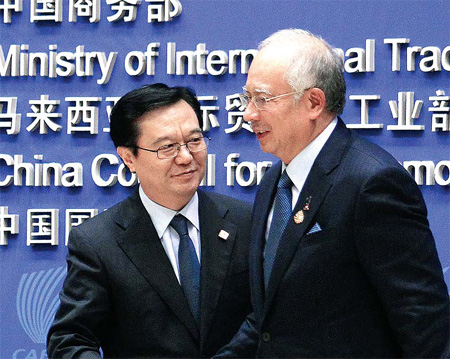China-Malaysia trade to hit $100b in 3 yrs
Updated: 2011-10-22 09:46
By Bao Chang and Huang Zhaohuang (China Daily)
|
|||||||||||
|
Malaysian Prime Minister Najib Tun Razak (right), and Gao Hucheng, China's vice-minister of commerce, at a roundtable discussion with Chinese CEOs during the Eighth China-ASEAN Expo. Feng Yongbin / China Daily |
New ventures and collaborations unveiled at expo with ASEAN bloc
NANNING - Trade between China and Malaysia is set to reach a new high of $100 billion by 2015. That's after the two countries agreed to deepen economic cooperation to reduce the impact of the global economic slowdown, according to Malaysian Prime Minister Najib Tun Razak on Friday.
He made the remarks at a roundtable discussion with Chinese CEOs during the Eighth China-ASEAN (the Association of Southeast Asian Nations) Expo, which is being held in the city of Nanning, the capital of the Guangxi Zhuang autonomous region, and runs from Oct 21 to 26.
"China and Malaysia are very important trade partners and we expanded our consensus on strengthening economic collaboration during the opening ceremony of the expo," said Gao Hucheng, China's vice-minister of commerce.
In the first seven months of 2011, bilateral trade between China and Malaysia reached $50.1 billion, an increase of 21.8 percent from the same period last year. In 2010, bilateral trade totaled $74.2 billion, an increase of 18.9 percent year-on-year.
China is Malaysia's biggest trading partner globally and Malaysia is China's biggest trading partner in the ASEAN bloc. Trade between the two countries accounted for 25 percent of the total between China and ASEAN members in 2010.
ASEAN is made up of Brunei, Cambodia, Indonesia, Laos, Malaysia, Myanmar, the Philippines, Singapore, Thailand and Vietnam.
In January 2010, a free-trade agreement was implemented between China and the ASEAN bloc.
"Electrical and electronic products, palm oil, rubber, machinery and equipment, and iron and steel will continue to top trade between Malaysia and China," Gao said.
In order to foster closer economic ties, the two countries will also increase efforts to attract more investment.
Agreements on four cooperative projects were signed between Najib and the Chinese CEOs during the roundtable discussion.
China National Technical Import and Export Corp and Tianjin Electric Power Construction Co will build a wind-power venture in Sri Lanka in conjunction with the Malaysian investment holding company Jaks Resources Berhad.
Meanwhile, China's Hawtai Motor Group and Malaysia's Proton Marketing Sdn Bhd will also establish a joint venture.
Najib said there is huge market potential in the energy, hydroelectric and telecommunication industries in Malaysia and its companies hope to gain experience in the high-technology sector from Chinese companies.
According to the Malaysian prime minister, market demand in the country's energy industry is registering annual growth of 4 to 5 percent.
China's investment in Malaysia exceeded $20 billion in 2010, an increase of 62 percent year-on-year.
"Chinese enterprises have just started their investment in Malaysia. Although the scale of investment is limited, the prospects are promising," Gao said.
Earlier this year, the two countries agreed to construct the China and Malaysia Qin Zhou Industrial Park in Guangxi, to attract Malaysian companies investing in China and expand the mutual benefits.











